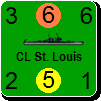pat.casey
Posts: 393
Joined: 9/10/2007
Status: offline

|
quote:
ORIGINAL: Emir Agic
Alfonso I think you are asking wrong question. Chess have simple rules which are same for whole course of game. In WitE you have sudden changes in rules, and there is a problem. I'm ok with rules but not with rules which balance game besides of what player have achieved to that point. It would be same as if all your pawns on turn X become queens, bishops, knights and all of my strong figures suddenly becomes pawns.
Agree with Emir on this point.
Its not a question of complexity, its a question of control.
Players of games like to feel as though they have control of the situation. Even if I make bad decisions and lose because of them, I can at least think "well, had I done x instead of y I would have won".
Chess, to use your example, is a game of perfect control.
Arbitrary game mechanics though, over which the player has no control, and which exist to achieve a specific, predetermined, outcome are no fun and are, frankly, damaging to gameplay.
To use an example from another genre of game, if you ever played the early, unpatched version of civ iii, there was a very annoying arbitrariness mechanism that they eventually patched away.
In brief, in early civ iii you needed certain strategic resources to build stuff. Bronze to build spearmen, iron to build swordsmen, horses to build cavalry, etc. The critical one from a gameplay standpoint though was coal, since you needed coal to industrialize and if you didn't industrialize, you were doomed to lose.
The kicker though was that resources didn't show up until you'd researched something that needed them, and they were not evenly distributed around the map.
So what would happen is you'd invest, say, 6 hours into a game of civ iii, research steam engine, and then discover that *you had no coal*, and, in point of fact, all the coal was in the center of another nation on the other side of the map, at which time you either abandoned or busted out the editor to give yourself a coal deposit.
Point being, that wasn't fun as a mechanic since there really was nothing you could do about it. It was just a big random dice the game rolled for you and if it came up wrong, you lost. Nothing you did could control it.
Fundamentally that's the problem I have with both the axis summer and soviet winters; there's really no way a player can control them (although I think axis summer is less of a problem since a soviet player can at least mitigate it). Give a player a mechanism to control winter attrition, even at a crippling cost to some other aspect of their war effort, and suddenly the player has a choice and feels better about the situation.
As long as there's nothing you can do about it though, its going to rub a lot of folks (me included) the wrong way.
|
 Printable Version
Printable Version














 New Messages
New Messages No New Messages
No New Messages Hot Topic w/ New Messages
Hot Topic w/ New Messages Hot Topic w/o New Messages
Hot Topic w/o New Messages Locked w/ New Messages
Locked w/ New Messages Locked w/o New Messages
Locked w/o New Messages Post New Thread
Post New Thread